Sewing Machine Needles: The Ultimate Guide
Sewing machine needles should match the fabric type and quality you are sewing - this provides the best result.
The fabric determines which size needle you need. If the needle is too thick for the fabric, it can tear the threads and make small holes in the fabric. If the needle is too thin, it may break if the fabric is too thick or heavy.
Which needle size should you choose?
The numbers on sewing machine needle indicates the needle thickness: the larger the needle size, the thicker the needle. And the thicker your fabric, the thicker the needle you need.
- Sewing Machine Needles - Size 60
Suitable for very delicate, extra fine and very thin fabrics - Sewing Machine Needles - Size 70
Suitable for light, delicate and thin fabrics - Sewing Machine Needles - Size 80
Used for the most common fabrics - Sewing Machine Needles - Size 90
Used for heavier and thicker fabrics - Sewing Machine Needles - Size 100
Typically used for the heaviest fabrics or multiple layers of heavy fabrics
Choose the right needle for the fabric
It's not just the thickness of the fabric that determines which sewing machine needle you use. The quality of the fabric is also a decisive factor.
You'll have more success when you choose a sewing machine needle designed for the type of fabric you're sewing.
Therefore, use a stretch needle for stretch fabrics such as jersey, fleece, velour and similar. Universal needles are perfect for solid fabrics (without stretch) - and there are sewing machine needles specially designed for fabric types like denim, microtex, leather and synthetic leather.
Finally, you’ll find sewing machine needles, which are particularly suitable for embroidery, buttonholes and decorative stitching.
Test before you start
Although needle thickness and fabric quality have a lot to say, the choice of sewing machine needle is never black and white. We therefore recommend that you always use a small piece of fabric to test the suitability of your chosen needle for your project.
If you find that the needle makes holes or skips stitches on your test fabric, test a different thickness or a try testing a different type of needle.
That way you're sure you've chosen the right needle before you put the needle in your real project.
Here is your overview of the different types of sewing machine needles
We have a wide range of sewing machine needles, so you're sure to find the right needle for your sewing project. On this page you can read more about the properties of each sewing machine needle.
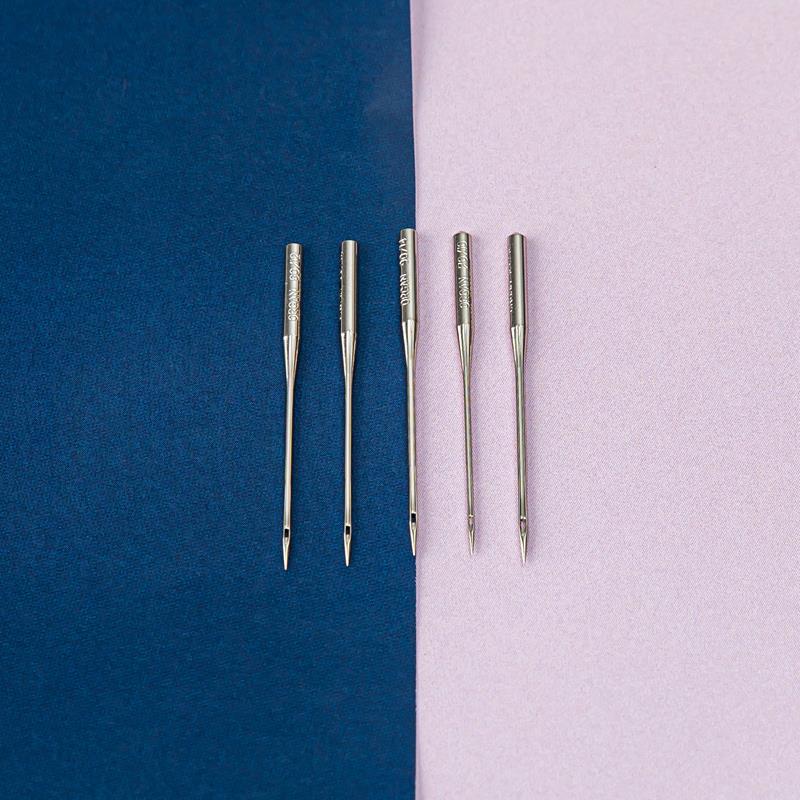
Universal sewing machine needles from size 70 to 100 are suitable for sewing in woven fabrics without stretch. The needles are suitable for standard sewing machines.
Size 70 - for cotton and viscose
Universal sewing machine needles in size 70 are suitable for sewing in ordinary thin woven fabrics without stretch - e.g. cotton and viscose.
Size 80 - for cotton canvas, linen, velvet and velour
Universal sewing machine needles in size 80 are suitable for sewing in plain, woven fabrics without stretch - e.g. cotton canvas, linen, velvet.
Size 90 - for denim and canvas
Universal sewing machine needles in size 90 are suitable for sewing in slightly heavier and thicker woven fabrics without stretch - e.g. denim and canvas.
Size 100 - for multiple layers of denim and upholstery fabric
Universal sewing machine needles in size 100 are suitable for sewing in heavy fabrics without stretch - e.g. multiple layers of denim and upholstery fabric.
Bundle with assorted sizes
We also offer universal sewing machine needles in a smart pack of 5 needles in different sizes. You can find the assorted universal needles here.
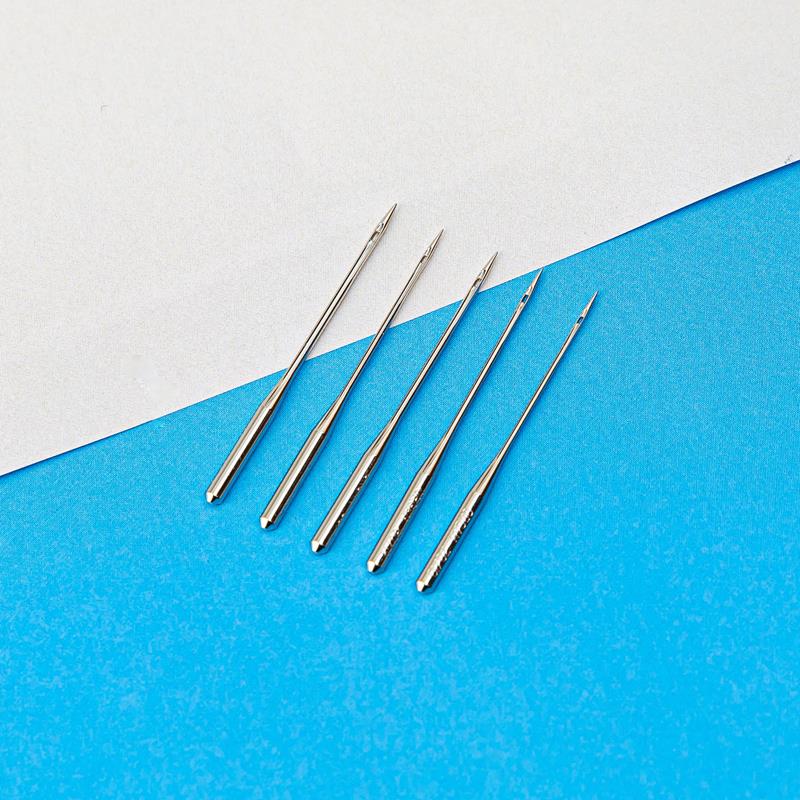
Jersey needles have a medium point (also called ball point), which easily penetrates knitted qualities. It prevents stitches or threads from running, so you won't get holes in your fabric.
That's why jersey needles are particularly suitable for knitted fabrics - e.g. all kinds of jersey, fleece, terry and velour.
The needles fit common sewing machines.
Size 70 - for light jersey
The size 70 jersey needle is the most commonly used needle size for lightweight jersey fabrics - e.g. single jersey (T-shirt quality).
Size 80 - for medium jersey and isoli
Size 80 jersey needles are good for stretch fabrics of medium thickness - e.g. Ponte de Roma, stretch isoli and stretch velour.
Size 90 - for terry, heavy isoli and fleece
Size 90 jersey needles are particularly suitable for heavier stretch fabrics - such as fleece, heavy isoli and terry.
Size 100 - for multiple layers of heavy stretch fabrics
The jersey needles in size 100 are used for the strongest stretch fabrics - e.g. thick fleece or several layers thereof.
Bundle with all sizes
We also sell the jersey needles in a handy pack of 5 needles in different sizes. You can find the assorted jersey needles here.
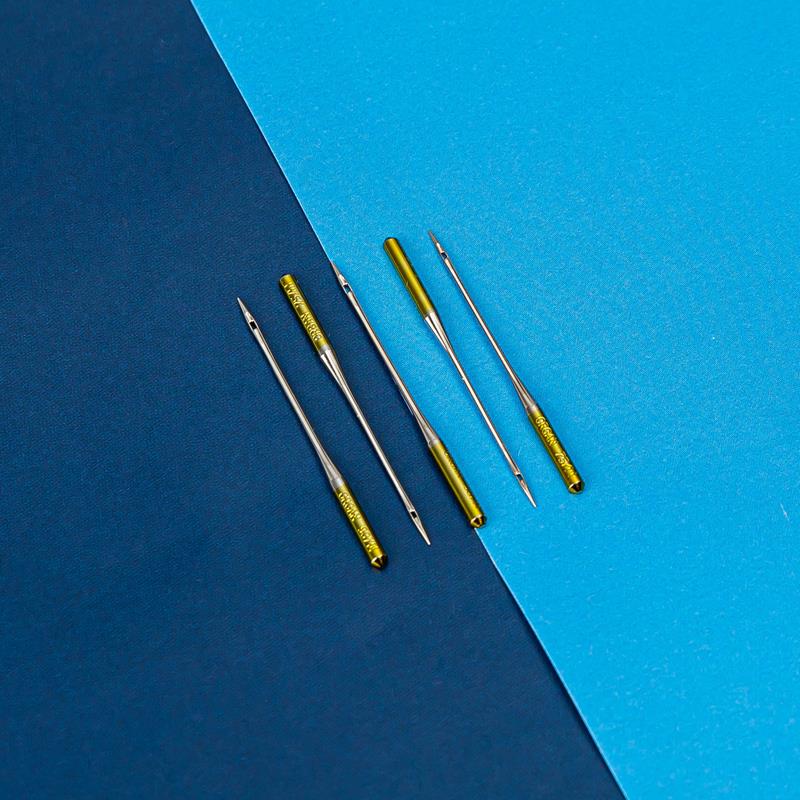
Super Stretch needles in sizes 75 and 90 have a medium point (also called ball point) that easily penetrates super stretch qualities - e.g. swimwear fabric or sportswear fabric. The slightly rounded point of the needle prevents stitches or threads from running, so you won't get holes in your fabric.
The shaft of a super stretch needle is also specially developed for highly elastic, smooth stretch fabrics. Therefore, you will find that using this particular type of needle prevents it from missing stitches.
Super stretch needles are particularly suitable for fabrics with lycra or elastane, such as latex, sportswear and elastic bands. We recommend using size 75 needles for thin, highly elastic fabrics such as swimwear qualities. Size 90 is suitable for thicker fabrics with a lot of stretch.
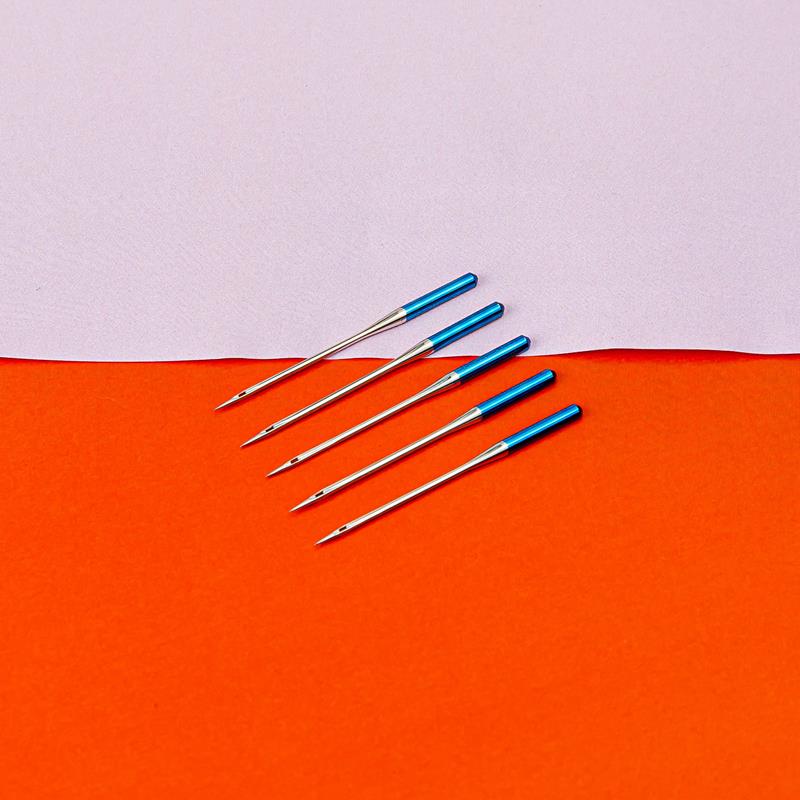
A jeans needle (also called denim needle) has a thin and sharp point that penetrates unhindered through heavy grades.
Jeans needles are therefore particularly suitable for sewing thick and heavy fabrics - such as denim, canvas and coated qualities. If you're sewing in stretch denim, we recommend you do a jeans needle dust test and switch to a stretch needle if the jeans needle is pulling holes in the fabric.
Jeans needles are suitable for standard sewing machines.
Size 90 - for denim, canvas and coated fabric
Size 90 jeans needles can grind through most heavy fabrics - denim, canvas and coated fabrics (dralon and similar).
Size 100 - for several layers of heavy fabric
Size 100 jersey needles are suitable for the strongest fabrics - e.g. heavy denim, canvas or multiple layers of e.g. denim.
Bundle with both sizes
We also offer the sewing machine needles in a smart bundle that includes jeans needles in sizes 90 and 100. You can find our assorted jeans needles here.
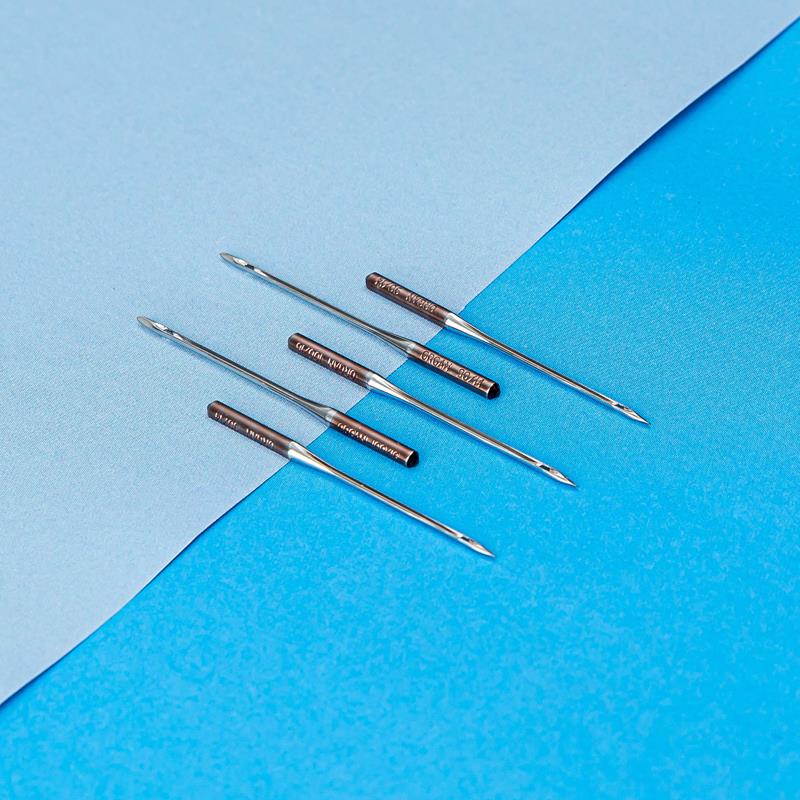
A leather needle (also called a skin needle) is particularly suitable for sewing in thick and sturdy materials such as leather, skins, suede and similar fabrics. The needle has a knife-shaped point that cuts through these materials easily.
Be aware that leather needles cut holes in the material you are working with. Therefore, this type of needle is not suitable for faux fur, faux leather or faux fur. Use microtex needles for these types instead.
Leather needles fit common sewing machines. Get leather needles in sizes 90 and 100 here.
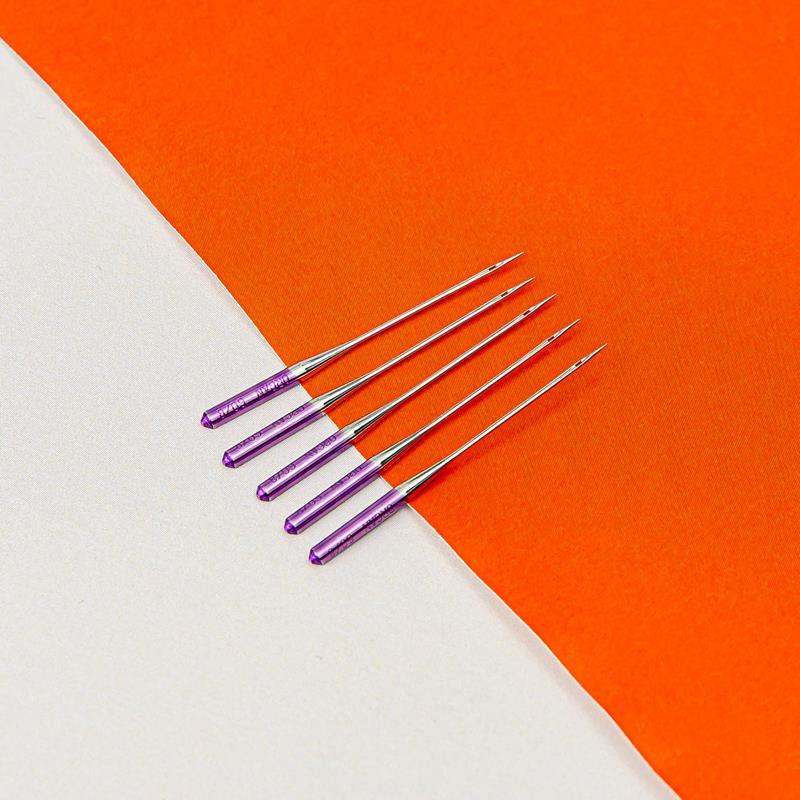
Microtex needles are very thin and have a thin tip that slides easily through very thin, fine qualities without pulling stitches/threads.
That's why microtex needles are suitable for fine and lightweight fabrics - such as silk, chiffon, thin viscose, satin and microfibre.
Microtex needles are also particularly suitable for sewing in faux leather. However, for multiple layers of faux leather, we recommend that you use a slightly thicker all-purpose needle to prevent your needle from breaking.
The needles fit standard sewing machines and are available in sizes 60 and 70.
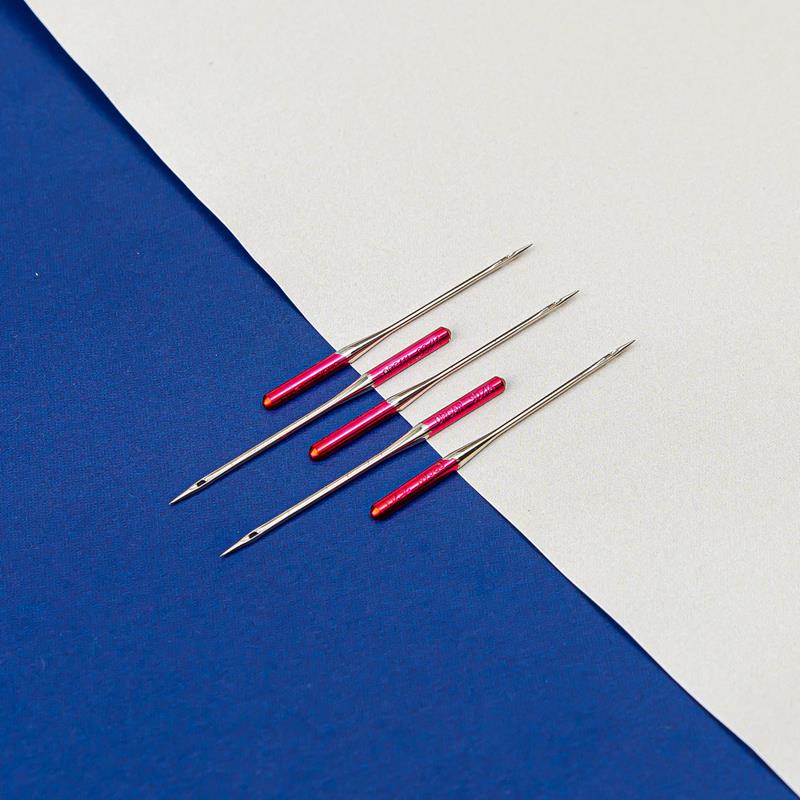
Embroidery requires fast movements with sewing in different directions. To avoid thread fraying or splitting, you can use an embroidery needle.
Embroidery needles for the sewing machine have a small point (also called ball point) and a large needle eye that protects the thread during embroidery. This makes the needles particularly suitable for embroidery on your sewing machine.
The needles fit common sewing machines.
Choose an embroidery needle with the right thickness
The size of the needle you need to use depends on the type of fabric you are embroidering.
Choose a size 75 embroidery machine needle for lightweight fabrics. Size 90 is more suitable for heavy fabrics.
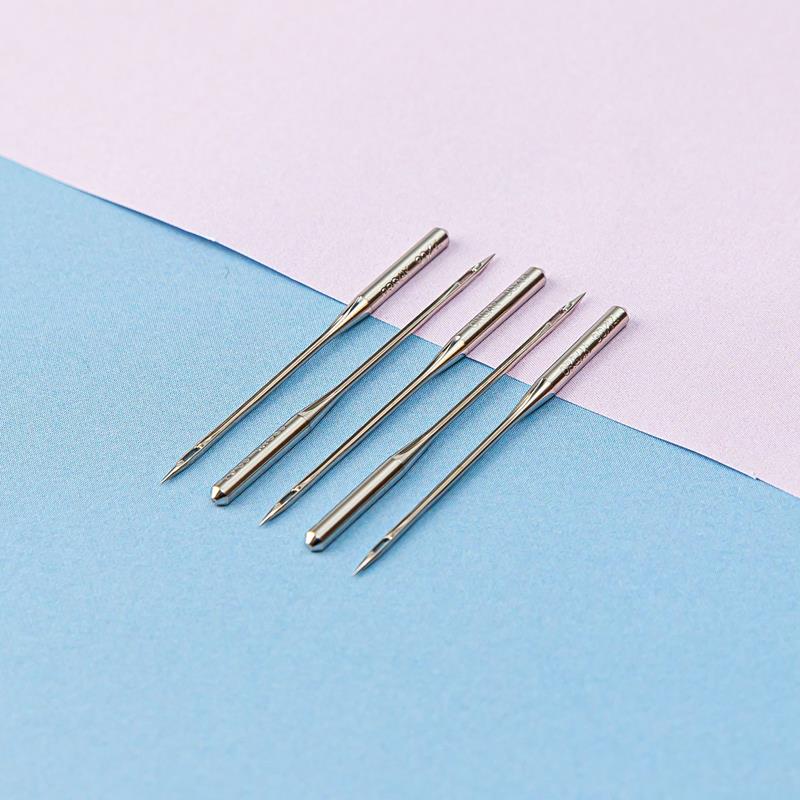
Top Stitch needles have a needle size of 90 and are for use in heavier fabrics. Their needle eye is larger and longer than ordinary needles, which helps prevent the threads of the fabric from fraying or splitting.
The needles are particularly suitable for quilting seams with quilting thread or for sewing buttonholes and decorative stitching with special threads such as metallic threads, furniture threads, denim threads and the like.
You can also use the needles for jeans and other denim styles that often make use of visible decorative stitching with denim thread.
Topstitch needles suitable for standard sewing machines
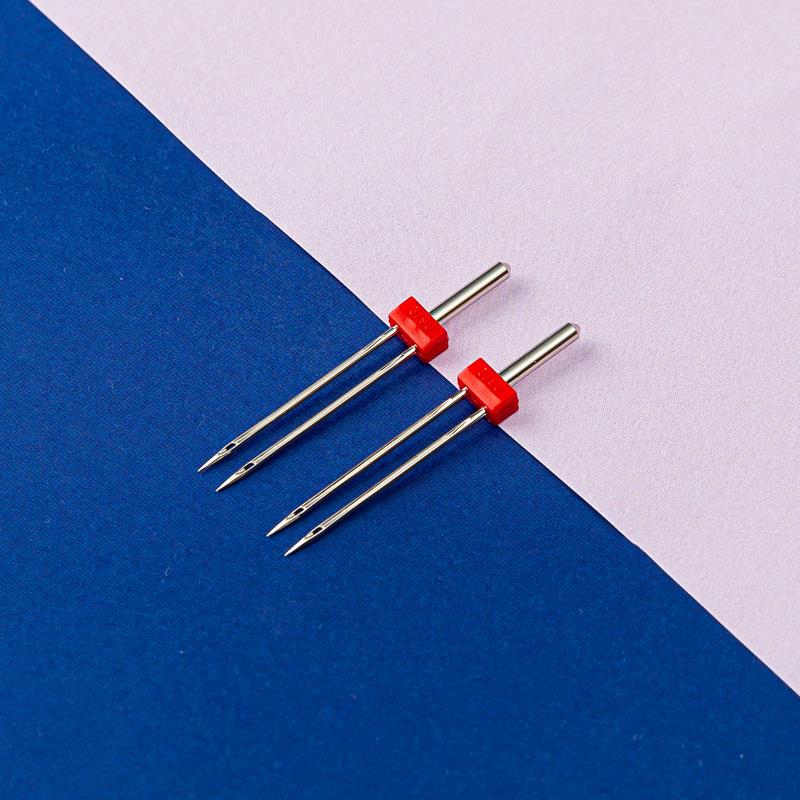
Twin needles (also called double needles) have two needles on one shank. You can use the needles for sewing two parallel stitches - for example for overlapping or as decorative stitches.
You can get twin needles in different sizes, just like you know the thicknesses from regular sewing machine needles. In addition, twin needles have an additional size designation that tells you the distance between the needles.
Example: our 2 pcs. Twin needles set 2,5 mm size 80 have 2 needles of size 80, which are placed 2,5 mm apart.
Size 80/2,5 mm - for plain weave fabrics
A size 80 twin needle is particularly suitable for sewing in plain weave fabrics without stretch - such as cotton canvas, linen and velour.
Size 90/3 mm - for heavier fabrics
A size 90 twin needle is particularly suitable for sewing in thick and slightly heavier qualities without stretch - such as denim and canvas.
Size 75/4 mm - for stretch fabrics
A size 75 stretch twin needle has a ball point tip that is particularly suitable for sewing in knitted qualities that include lycra, elastane and the like. This type of twin needle is good for jersey, stretch-isoli or stretch-velour, for example.
Twin needles fit common sewing machines.
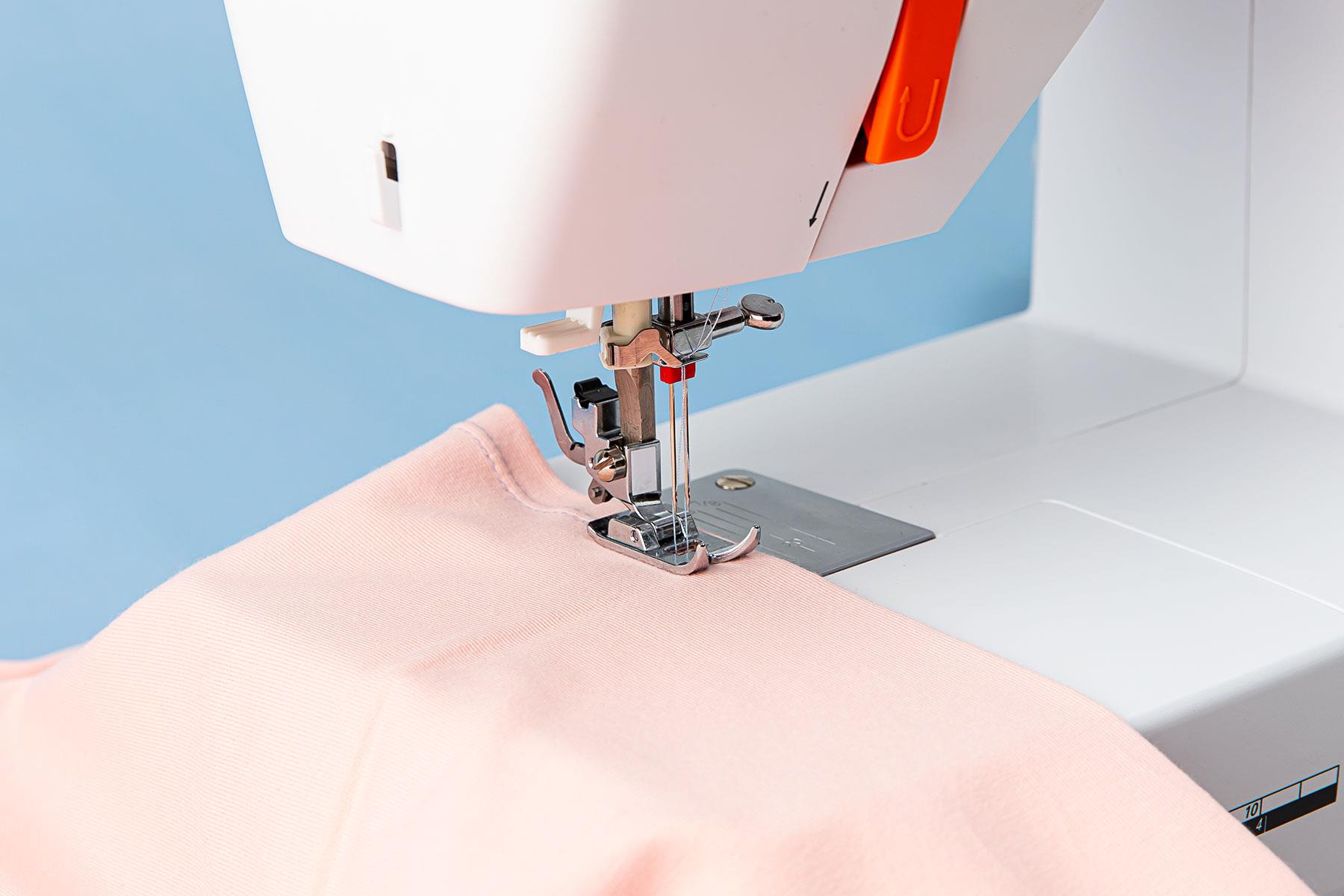
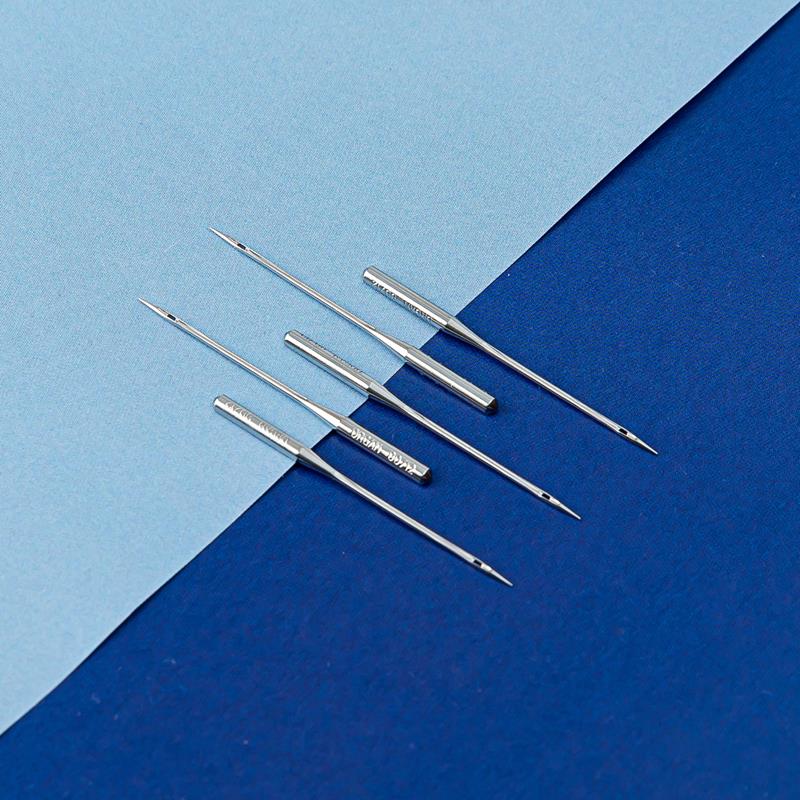
You can use regular sewing machine needles for most overlock machines. But for best results, we recommend you choose an overlock needle.
Overlock needles are special needles for overlockers and coverlock machines. These extra strong needles have extra high precision and are specially designed to withstand the high speed of the overlocker and coverlock machine.
For your overlock needles, make sure they match the quality you're sewing with - this will give you the best results.
EL x 705 CR Size 80 - for solid fabrics
EL x 705 CR overlock needles have a small point (also called ball point) that glides easily through woven and solid qualities..
Therefore, these overlock needles are particularly suitable for sewing in fabrics such as cotton, upholstery fabrics and the like.
EL x 705 CR SUK Size 80 - for stretch fabrics
EL x 705 CR SUK overlock needles have a medium point (also called ball point) that glides easily through knitted qualities.
That's why the overlock needles are particularly suitable for sewing in fabrics such as isoli, jersey, terrycloth and similar qualities.
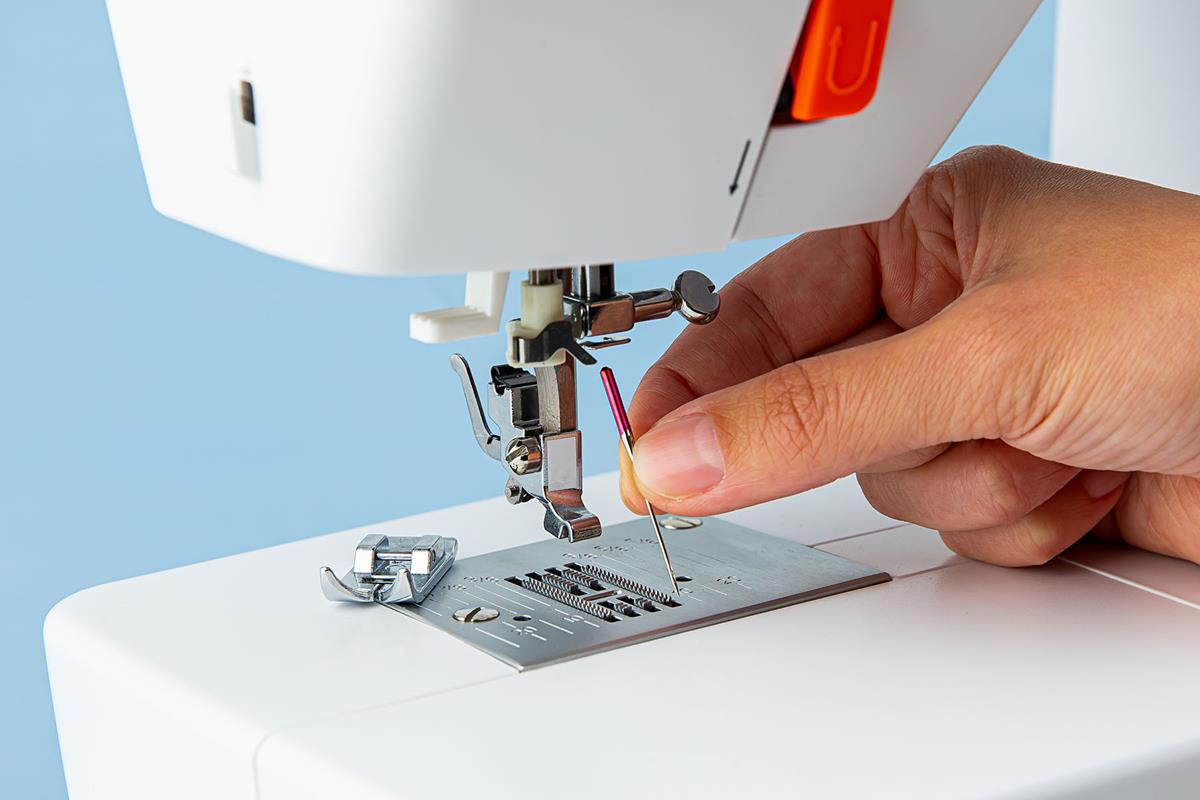
If you are reading this and think, I don’t even know what kind of needle is in my sewing machine, never mind the last time it was changed… You are not alone!
Your sewing machine needles are really put to work when you sew. Your needle punches through your fabric layers countless times and at high speed. This dulls your needlepoint, so you regularly need to change your needle.
How often do I need to change needles?
There is no clear answer, as it depends on your sewing projects. But as a rule of thumb, we recommend changing the needle after 8 effective sewing hours.
How do I know when to change my sewing machine needle?
But only very few people log the time used per needle… And don't worry - nor do you have to, as there are a few "warning signs" of your needles becoming dull.
Because dull needles:
- sew less neat
- can make holes in your fabric
- can make your machine skip stitches
- can bend, potentially damaging your machine.
As dull needles will affect your sewing result. You'll notice your machine no longer sews neatly and can make holes in your fabric.
Additionally, as your machine has to force itself through the fabric, this can cause the needles to bend. In the worst case, this can damage your sewing machine.
More experienced sewists can often hear from their machine's sound that the time has come to change needles. As household machines tend to become noisier as your needle goes dull.
But the easiest way to test the needle is to take it out and (carefully!) feel the tip. Does it feel blunt? Then change it.